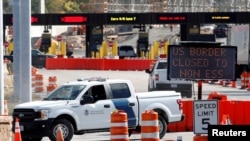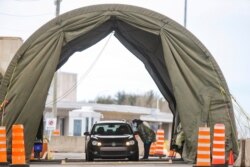A formal announcement on the reopening of the 8,891-kilometer U.S.-Canada border could come any day. The border has been closed to all nonessential travel since March 2020 because of the coronavirus pandemic.
Bill Blair, Canada's Minister of Public Safety and Emergency Preparedness, announced on Twitter Friday the closure was extended one additional month. He added that the Canadian government "is planning measures for fully vaccinated Canadians, Permanent Residents, and others who are currently permitted to enter Canada." He said further details would be provided on Monday.
The closure of the world's longest undefended boundary has been renewed every month since.
According to the U.S. State Department, before the pandemic, an average of 400,000 people crossed the border daily. About $2 billion a day in trade made the same journey.
The government of Canadian Prime Minister Justin Trudeau has signaled the reopening will be gradual and subject to restrictions.
Kelley Lee, professor of global health at Simon Fraser University in Vancouver, expects that people traveling for nonessential purposes will be put into four categories.
"What it will look like is that we'll go towards a system where people are put into categories based on their immunization status," Lee said. "So, there would be fully vaccinated, partially vaccinated, non- or unvaccinated, and then people who have been previously infected, so they'll have some immunity through that natural infection."
Lee says the best way to easily determine a traveler's category would be through a vaccine passport, which some see as cumbersome or otherwise objectionable.
"And I think that they probably are the right way to go, if they are implemented properly and implemented in a way that is tied to risk analysis. So, you know, if we know that fully vaccinated people do not pose a risk, but we know how to manage that risk and to lower risks, not a zero risk, then we can use those passports," she said.
Goldy Hyder, president and chief executive of the Business Council of Canada, says as more people become vaccinated, pressure builds on the government to allow more travel.
"So there's a pivot taking place here psychologically in the minds of Canadians," he said. "And I think they've moved from fear to hope. And they want to know what the benefits of being fully vaccinated are. So the government's first reaction, I think, will be timid. But I do believe that they're going to move very quickly ... because I think they're going to realize they're falling behind where the public mood is on this issue."
Hyder does not like the term "vaccine passport" because it has different connotations and would not be like a traditional travel document. He also feels that anything being implemented should not discriminate against those for whom getting vaccinated poses health risks.
"So I think we have to be careful that we don't even punish those who for good science reasons, health reasons, may not be able to be vaccinated, and there are people who fall in that category. So, you can't deny them the right of mobility," he said.
One industry that has long depended on traditional passports is tourism, one of the hardest hit during the pandemic.
Walt Judas, CEO of the Tourism Industry Association of British Columbia, says any type of definitive reopening of the border is welcome, even if done gradually.
"This month-to-month carryover has been really detrimental. And so many businesses have either failed or are on life support because of it," Judas said. "They can't plan, they have to cancel their guests, they have to offer refunds. And really they rely almost exclusively on international visitation. So not having a plan has really hurt the industry over the long run."
As of June 11, the Canadian government said just over 70 percent of adults had gotten at least one dose of COVID-19 vaccine, and a little more than 9 percent were fully vaccinated.
The U.S.-Canada border has 117 legal crossing points.





